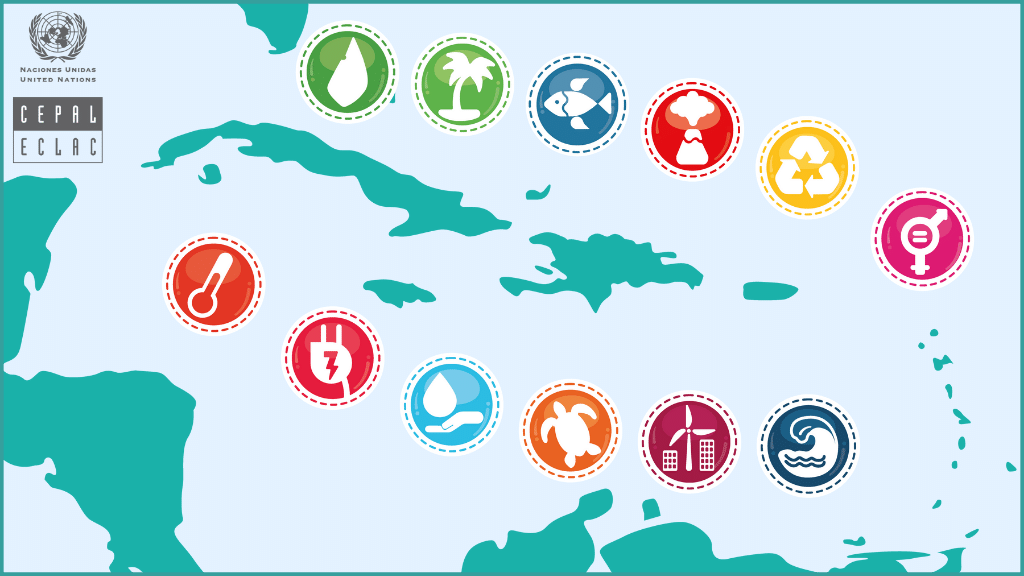Saint Lucia: National workshop on generating climate change and disasters indicators for policy decision-making
Work area(s)
Teaser
Organized by Economic Commission for Latin America and the Caribbean (ECLAC) and the Ministry of Education, Sustainable Development, Innovation, Science Technology, in the framework of the Development Account 12 project.
Event information

Date
12 - 16 Nov 2021, 06:00 - 09:00Event type
Participation
The Caribbean region is acutely threatened by climate change, particularly the Small Island Developing States (SIDS). Saint Lucia is no exception. It is situated in the tropical cyclone belts and is directly exposed to the forces of the oceans. And as a small geographical area, disasters might affect vast proportions of the country.
Availability of quality statistics and indicators are crucial to effectively respond to the effects of climate change and build resilience. In this regard, Saint Lucia has put in place a National Environmental Information System (NEIS), and it has a dedicated section on environment statistics on the Central Statistical Office website. However, like other Caribbean SIDS, Saint Lucia faces statistical and institutional challenges. There is a need to enhance the production and use of environment, climate change and disasters indicators to draw attention to national priorities and better engage in adaptation to climate change processes.
Against this backdrop, the ECLAC´s Statistics Division, Subregional Office for the Caribbean, in collaboration with the Sustainable Development and Human Settlements Division, are joining forces to enhance the production and use of key indicators and metrics to monitor and adapt to the effects of climate change and strengthen Environmental Information Systems (EIS). These efforts, supported by the Development Account of the United Nations, aim to boost the environmental pillar of the 2030 Agenda and improve policy coherence in the implementation of the Escazú Agreement, the Revised St. George´s Declaration (SGD 2040), the SAMOA Pathway, the Paris Agreement, and the Sendai Framework.
Objectives
- Train the participants to build selected environment, climate change and disaster indicators and its metadata.
- Identify data and capacity gaps to improve the Environmental Information System (EIS) and build a regional resilience platform.
- Have a better understanding of how geospatial data can enhance the use of environment, climate change and disaster indicators for effective decision making.
Expected outcomes
- At least three prioritized climate change or disasters indicator and its metadata is available at theend of the workshop.
- A list of relevant and prioritized climate change and disasters indicators for Saint Lucia that are alsolinked to the Paris Agreement and the Global Set on Climate Change Indicators and Statistics of theUNSD.
- Follow up steps to build further selected climate change and disasters indicators is agreed with theCSO and key stakeholders.
Programme of work
Inaugural session and introduction to the workshop
» Moderator: Karina Cázarez, Statistics Division of ECLAC
Opening remarks
▪ Anita Montoute, Permanent Secretary, Ministry of Education, Sustainable Development, Innovation, Science Technology and Vocational Training
▪ Richard Harris, Deputy Director, Central Statistical Office of Saint Lucia
▪ Reena Shah, Chief, Environment Statistics Section, UNSD
▪ Barbara Adams, Deputy Program Manager, CARICOM Secretariat
▪ Chamberlain Emmanuel, Head of Environmental Sustainability Division, Organisation of Eastern Caribbean States, OECS
▪ Rolando Ocampo, Director, Statistics Division of ECLAC
Detailed agenda (PDF) of the national workshop
Presentation(s)
Presentation of the participants
1. Environment, climate change and disasters indicators for Saint Lucia: Needs and priorities
Presentation(s)
National policies and plans where environment, climate change and disaster statistics and indicators are required
Global Set of Climate Change Statistics and Indicators: a tool to identify multi-purpose indicators on climate change
Climate Change Statistics and Indicators in the Caribbean
» Questions and Answers Session | Group photo
2. What is needed to produce and use environment, climate change and disaster statistics and indicators?
Presentation(s)
Framework for the Development of Environment Statistics (FDES)
Stages of statistical processing and statistical classifications and typologies
The geospatial dimension of environment, climate change and disaster statistics and indicators
The Escazú Agreement: strengthening Environmental Information Systems (EIS)
Types of data sources used in Saint Lucia: strengths and weaknesses
» Questions and Answers Session
» Choosing the indicator to be built during the workshop
» Conclusion of the day, homework and what to expect for day 2
3. Recap from day 1 and introduction to day 2
» Moderator: Alberto Malmierca, Statistics Division of ECLAC
Presentation(s)
What are the most relevant climate change and disasters indicators for Saint Lucia? Results from homework exercise
4. How to produce environment, climate change and disaster statistics and indicators?
Presentation(s)
From data to environment, climate change and disaster statistics and indicators
ECLAC´s methodology to produce environment, climate change and disasters indicators
» Questions and Answers Session
5. Building selected environment climate change and disasters indicators with national data (Part I)
Presentation(s)
Instructions for break out groups exercise
1) Break out groups: building selected climate change and disasters indicators
2) Insights from the groups and Questions and Answers Session
» Conclusion of the day, homework and what to expect for day 3
6. Recap from day 2 and introduction to day 3
» Moderator: Teshia Jn Baptiste, ECLAC
Presentation(s)
Interactive quiz on Methodological Sheet
7. Methodological Sheets for environment, climate change and disasters indicators
Presentation(s)
How to develop a methodological sheet and examples of methodological sheets
» Questions and Answers Session
8. Building selected indicators with national data (Part II)
Presentation(s)
Instructions for break out groups exercise
1) Break out groups: filling out the methodological sheet of the selected indicators
2) Reporting back and Questions and Answers Session
» Evaluation of the workshop
» Closing remarks